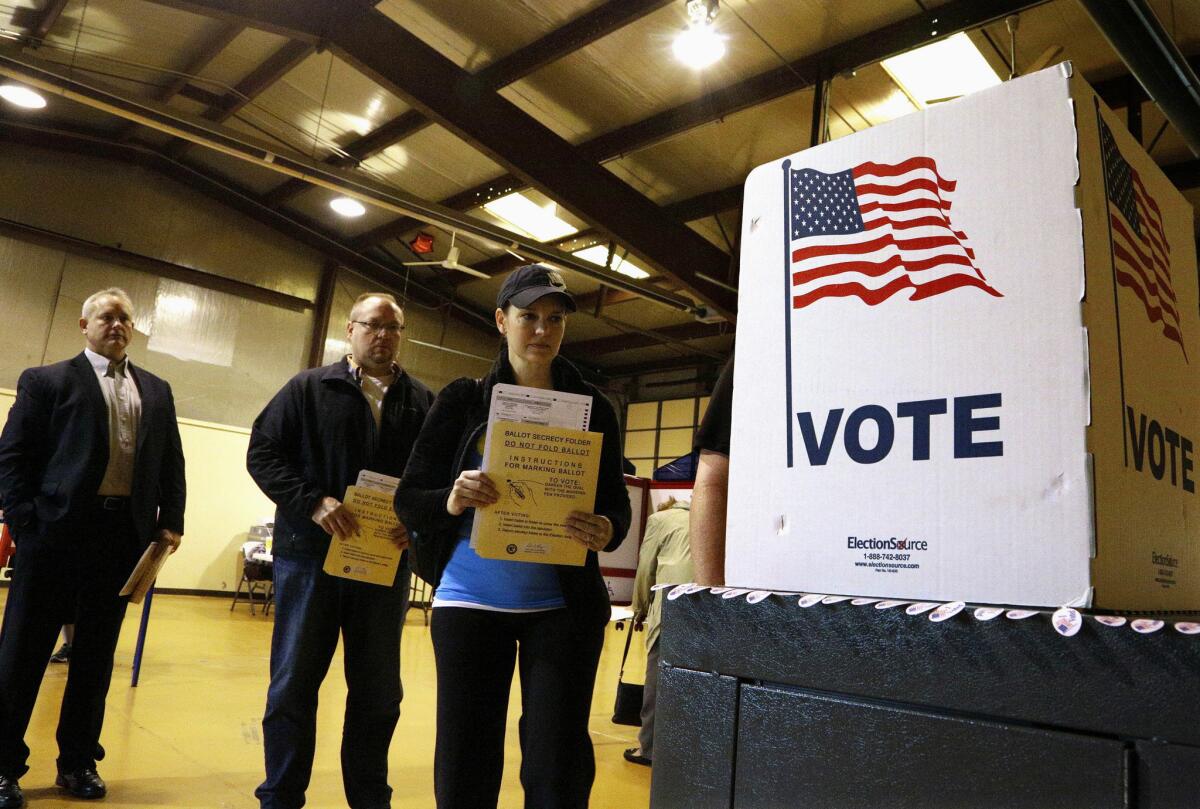President Trump says it’s illegal to be registered to vote in two states — but he’s wrong

It was a forceful condemnation — a vow to wipe out a serious crime.
“I will be asking for a major investigation into VOTER FRAUD, including those registered to vote in two states,” President Trump boomed on Twitter last week.
But Trump’s social media decree missed a crucial fact: It’s not illegal to be registered to vote in multiple states. It is, however, a felony to cast ballots in more than one state — yet it rarely happens.
Trump’s tweet storm about voter registration — and his unfounded claim that millions of illegal votes were cast for Democratic rival Hillary Clinton in November — has cast a spotlight on voting procedures nationwide. That spotlight has revealed some ironies.
Trump’s son-in-law and advisor, Jared Kushner, is registered in more than one state. The same is true for some of the president’s senior officials, including his pick to lead the Treasury Department, Steven Mnuchin, along with senior advisor Stephen K. Bannon and Press Secretary Sean Spicer.
Even Gregg Phillips, creator of the app VoteStand — which helps Americans report perceived voter fraud — and who Trump has boasted is a guru on the issue, appears to be registered in Alabama, Mississippi and Texas, according to the Associated Press.
“We need a national voter ID number that travels with us from state to state,” Phillips tweeted on Monday in response to the AP story. “This double and triple registration problem would end quickly.”
A 2012 Pew Charitable Trusts study found that 2.75 million people were registered to vote in multiple states, usually because they had recently moved.
Kay Stimson, a spokeswoman for the National Assn. of Secretaries of State, says election officials strive to keep voter registration rolls accurate and up-to-date.
“Sometimes a voter who has moved or has died ends up on more than one list until the jurisdiction receives notification of the change and can legally remove the voter from their list,” Stimson said.
The National Voter Registration Act, passed by Congress in 1993, leaves purging voter rolls up to state officials.
Following the close presidential race in 2000 — a battle centered on ballots in Florida — the Help America Vote Act was passed, requiring that each state keep a centralized voter registration database. The new law didn’t, however, require states to share data with one another.
In 2005, a report by the U.S. Election Assistance Commission, an independent government agency, recommended that states coordinate by using certain federal databases, such as the U.S. Postal Service’s change-of-address system. (Some states heeded the recommendation; others did not.)
But keeping track of voters isn’t easy.
The Pew study found that in Clark County, Nev. — home to Las Vegas — more than 150,000 people moved from the addresses they had on file with the county election office between 2009 and 2010. That means more than 20% of the county’s 700,000 active registered voters relocated within a year.
Efforts to reduce the number of people registered in different states is noted on the federal government’s voting help website, which tells users that when they register to vote in a new location, “you’ll be asked for your previous address.” The site suggests that the new election office will notify the old one.
Still, that does not always happen.
Colorado Secretary of State Wayne Williams, a Republican, says the issue of voters registering in more than one state is a serious concern.
“We’re a mobile society and maintaining accurate lists is critical,” he said. “We get updates from the DMV and from the post office, but nothing is always certain.”
Despite millions of people perhaps being registered in more than one state, voter fraud is not widespread. In fact, reports have shown that, for the most part, it is nonexistent.
Danielle Lang, deputy director of voting rights for the nonpartisan Campaign Legal Center, says Trump’s effort is trying to conflate two separate issues.
“It has sought to draw a link between the unsurprising notion that our voter registration lists are not always up-to-date and voter fraud — a link that does not exist,” Lang said. “People move; people die. The bureaucracy doesn’t always catch up with those daily facts. That does not mean there is widespread voter fraud. The evidence shows that there is not.”
Indeed, a recent comprehensive report into voter fraud, conducted by the nonpartisan Brennan Center for Justice, found 31 credible instances between 2000 and 2014 of voter impersonation out of more than 1 billion votes cast. The report examined every federal election in that time frame.
To some, Trump’s claims of election fraud show a president who cannot accept that he won the electoral college but lost the popular vote by 2.9 million.
“This is all ego, and it’s extremely detrimental to our democracy,” said Todd Eisenstadt, a professor of government at American University in Washington, D.C.
He added, “It’s an excuse for a bad popular-vote loss.”
Twitter: @kurtisalee
ALSO
Trump administration signals that some bans on U.S. entry could be extended indefinitely
California father, 12-year-old daughter stuck in Africa following Trump travel ban, lawyer says
More to Read
Start your day right
Sign up for Essential California for news, features and recommendations from the L.A. Times and beyond in your inbox six days a week.
You may occasionally receive promotional content from the Los Angeles Times.







